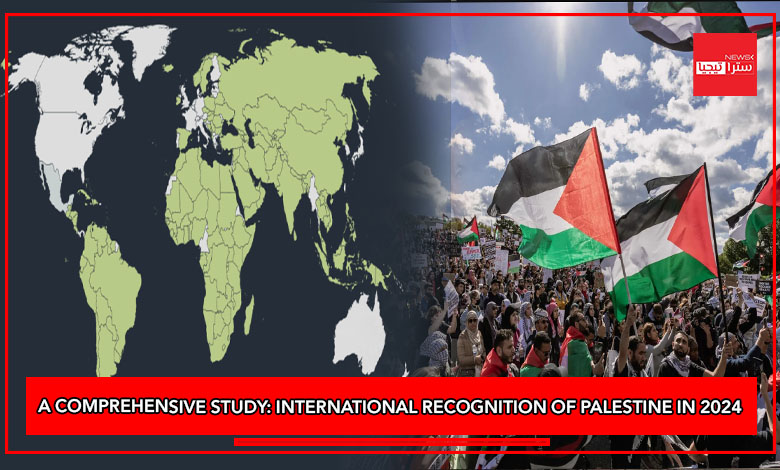Department of Strategic Security and Military Research and Studies 29-11-2024
The recognition of Palestine as a sovereign state has been a focal point of international diplomacy for decades. In 2024, this issue remains pertinent, especially amidst the ongoing Israeli-Palestinian conflict, which has amplified calls for Palestinian self-determination. As of this year, 146 to 148 countries officially recognize Palestine, representing approximately 75% of United Nations member states. This report delves into the historical context, recent developments, and the geopolitical implications of Palestine’s quest for global recognition.
Historical Context of Recognition
The foundation of Palestine’s recognition began on November 15, 1988, when Yasser Arafat declared independence during the first Intifada, designating East Jerusalem as its capital. Within months, over 80 countries, largely from the Global South, acknowledged Palestine’s statehood. Support came predominantly from African, Asian, Arab, and Latin American nations, influenced by anti-colonial sentiments and solidarity with Palestinian resistance.
European recognition was initially tied to the Soviet bloc, with countries like Poland, Hungary, and Bulgaria offering early support. The signing of the Oslo Accords (1993) brought optimism for a two-state solution but failed to secure a consensus on Palestinian sovereignty.
This year saw a significant shift in global attitudes, catalyzed by the Israeli military campaign in Gaza. The recognition of Palestine gained momentum, with nine new countries formally acknowledging Palestinian statehood: Armenia, Slovenia, Ireland, Norway, Spain, the Bahamas, Trinidad and Tobago, Jamaica, and Barbados. This wave was particularly notable for the inclusion of European nations like Ireland, Spain, and Slovenia, marking a challenge to the traditional Western bloc’s hesitance.
These recognitions are aligned with Palestine’s pre-1967 borders and underline East Jerusalem as the proposed capital, countering Israeli settlement expansions. Countries such as Malta and Belgium are reportedly considering similar moves, hinting at a possible broader European shift in the near future.
These recognitions reflect a growing international consensus around the necessity of supporting Palestinian statehood, particularly in the face of continued violence and humanitarian crises. The formal recognitions also reaffirm the 1967 borders as the basis for a two-state solution.
Current Landscape of Recognition
Today, the countries that recognize Palestine include a wide array of nations, primarily from:
The Global South:
Strong support has come from countries in Africa, Asia, and Latin America. Notably, all African nations except Eritrea and Cameroon recognize Palestine.
Europe:
While Western Europe has been more hesitant, nations like Sweden (in 2014) and now Ireland, Norway, and Spain (in 2024) are shifting the dynamic. Discussions in countries like Malta and Belgium suggest more potential support from Europe in the near future.
Middle East and Asia:
Arab nations, alongside significant Asian powers such as China and India, have been long-standing supporters of Palestine’s independence.
However, notable holdouts include G7 nations like the United States, the United Kingdom, France, and Japan, which often argue that recognition should be part of a comprehensive peace agreement negotiated with Israel.
Key Holdouts
Despite widespread support, notable absences remain, including the G7 nations—the United States, Canada, France, Germany, Italy, Japan, and the United Kingdom. These nations argue that recognition should follow a negotiated peace settlement between Israel and Palestine. The United States, in particular, wields its veto power in the UN Security Council to block recognition efforts, citing concerns about bypassing direct negotiations. This position reflects broader Western alignment with Israel’s security concerns and strategic interests.
Geopolitical Implications
Strengthened Palestinian Advocacy
Recognition enhances Palestine’s ability to engage in international forums, such as the International Criminal Court, to challenge Israeli policies. It also legitimizes calls for an end to the occupation and reinforces the two-state solution as a viable framework.
Shifts in Global Alliances
Growing support from Europe signals a potential rebalancing of alliances, challenging traditional Western consensus. The expansion of recognition within Latin America and the Caribbean demonstrates the region’s enduring solidarity with Palestine.
Israel’s Response
Israel views these recognitions as unilateral acts undermining peace negotiations. The country has responded with measures such as recalling ambassadors and announcing new settlement expansions in the occupied West Bank.
Conclusion
The recognition of Palestine reflects a complex interplay of historical allegiances, geopolitical strategies, and shifting international norms. While a substantial majority of the world recognizes Palestine as a state, the absence of key global powers from this consensus continues to hinder its full integration into the international community. Moving forward, the trajectory of Palestinian recognition will likely depend on developments in the Israeli-Palestinian conflict and evolving regional dynamics.
This growing wave of support underscores the urgent need for renewed diplomatic efforts to resolve one of the most enduring conflicts in modern history.

